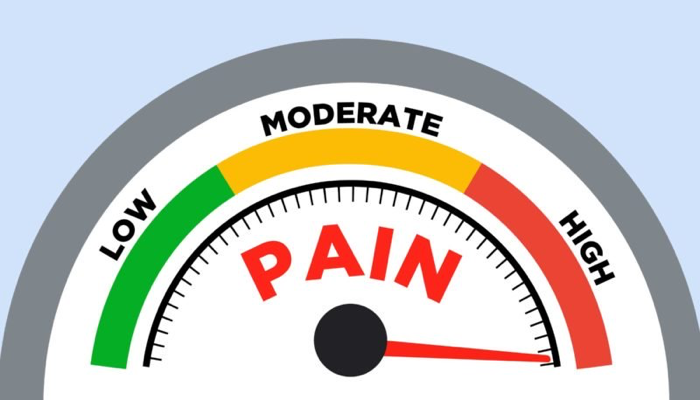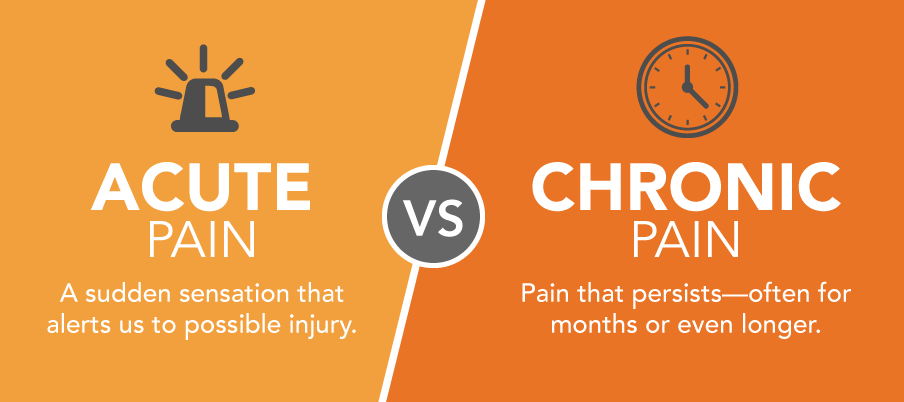
Understanding pain
Long-term pain has many causes, such as arthritis, back problems, an old injury, illness or nerve damage. If you have been struggling with pain for more than three months, there are many services that can help.
What is pain?
The brain and the nerves inside the spine make up the central nervous system. The spinal nerves carry messages from the body to the brain to tell it what's going on. The brain acts like a control centre working out from these messages if it needs to do anything. It's sometimes easier to think of how the messages and the brain combine together to form an alarm system. It's the brain’s interpretation of this information from the alarm system that results in the feeling of pain. Sometimes the brain’s interpretation of these signals isn't accurate.
We usually expect pain to settle down with time but sometimes the brain continues to send out pain signals. These signals can be hard to stop, are often intense and at times seem to come for no obvious reason. This fact isn't always easy to understand but it important to understand that this pain is still real.
Chronic pain

Acute pain is a sudden unpleasant sensation that alerts us to injury. Chronic or persistent pain is pain that carries on for longer than 12 weeks despite medication or treatment. Most people get back to normal after pain following an injury or operation. But sometimes the pain carries on for longer or comes on without any history of an injury or operation.
Chronic pain can also affect people living with:
- Diabetes
- Arthritis
- Fibromyalgia
- Irritable bowel syndrome
- Back pain
Chronic pain affects up to 1 in 5 people. It can affect people of all ages and all parts of the body. It isn't possible to tell in advance whose pain will become chronic. But we know that people are more likely to develop chronic pain during or after times of stress or unhappiness. People can also experience chronic pain even after usual medical tests don’t provide an answer.
What causes chronic pain?
Chronic pain is a complex phenomenon, affected by biological, psychological, social, cultural and environmental factors. After 3-6 months, most injured tissues will have healed as best they can. With chronic pain, tissue damage is not the main problem. Instead, the central nervous system has become over-sensitised and is communicating pain messages when it does not need to. This is why pain relieving medication is often not helpful.
Managing chronic pain
Thankfully, the central nervous system can be retrained by paying attention to other things that influence it, like our mental and emotional health, stress, eating habits, drug use (including smoking and alcohol) and activity levels. In fact, these are more important (and more effective) for chronic pain than even the strongest pain relieving medication.
The old-fashioned treatment for chronic pain was bed rest for weeks or months on end. We now know this is the worst possible approach. Exercise and continuing to work are key to recovery. Forget resting if you have a painful condition like back pain. Lying in bed for long periods may actually make the pain last longer because inactivity makes you stiffen up, your muscles and bones get weaker, you don't sleep well, you become lonely and depressed, and the pain feels worse. You'll also find that it becomes harder and harder to get going again.
A better approach to reducing pain is a combination of:
There are courses and counselling available to help with the management of chronic pain. The pain toolkit is one example. It is a self-guided pain management programme packed full of useful advice.
Video: Understanding pain in less than five minutes
This is an excellent video explaining chronic pain and how it can be managed to reduce the impact on your quality of life.
Local services
You can speak to one of the GPs if you need advice or information about diagnosing or managing pain. There are services available locally to support people who are experiencing chronic pain.
A new Persistent Pain Service is now available at Belfast City Hospital. It provides modern evidence-based management of complex pain and includes a series of tutorials called Pain Retrained. These tutorials provide education about chronic pain and training on managing pain by modifying your thoughts, emotions and behaviours, pacing yourself with physical activity, reducing stress, improving sleep, practicing relaxation techniques, using medication appropriately, setting goals for the future and techniques for managing flare-ups of pain. For more information, visit the Persistent Pain Service website. A GP can refer you to this service.
Other resources for chronic pain
Here are links to various online resources that you might find helpful.














